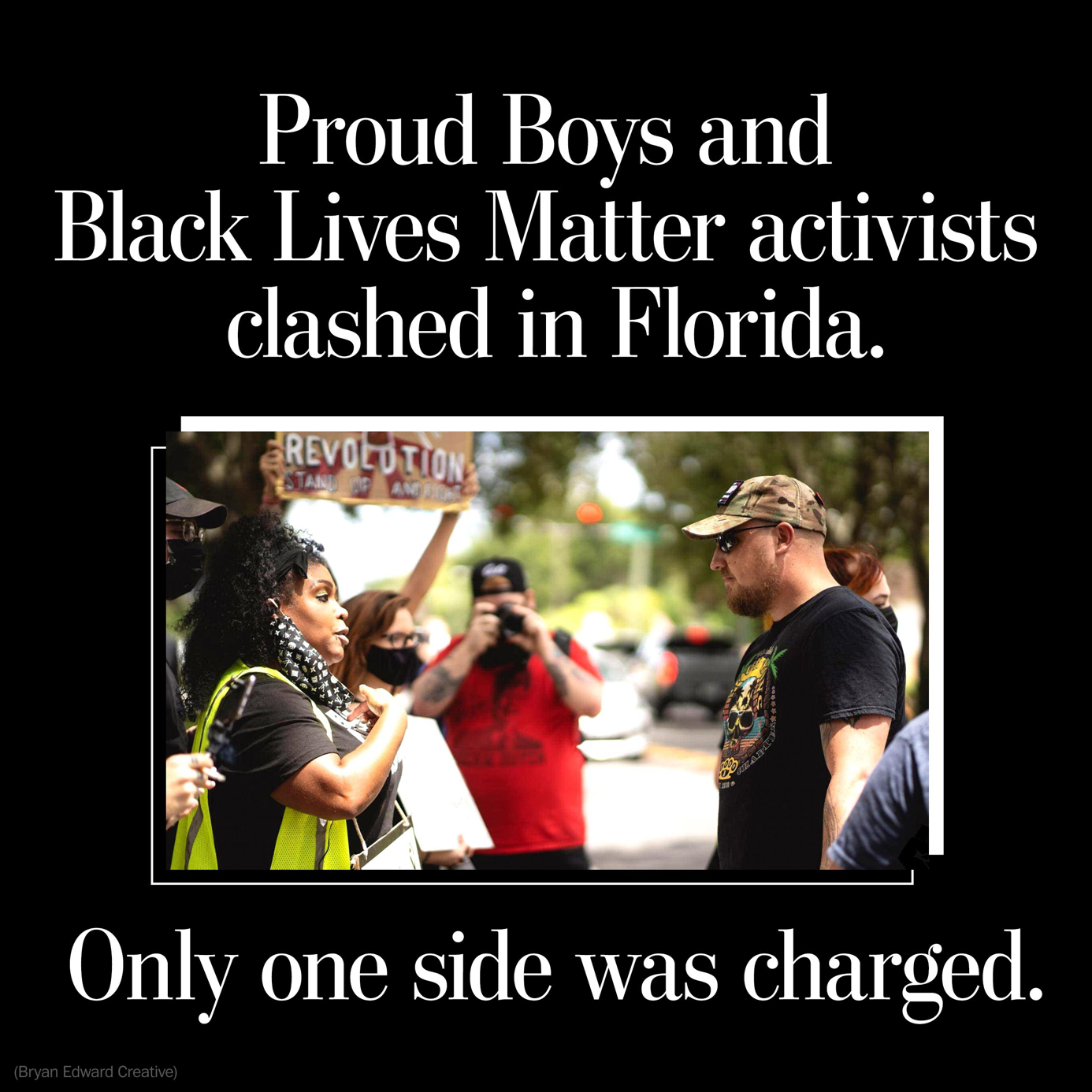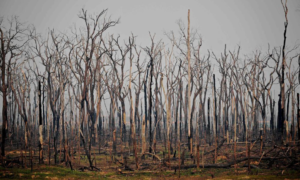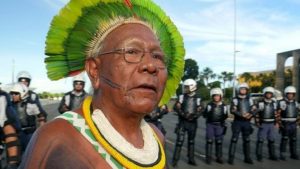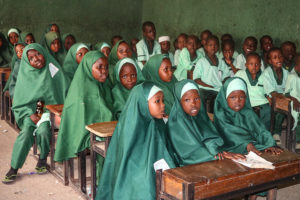When local Black Lives Matter activists started marching through the small, coastal town of New Port Richey, Fla., last summer — shouting slogans through bullhorns demanding racial justice — it took only a few days for the Proud Boys and other counterprotesters to show up and confront them.
Burly groups of mostly White men encircled the demonstrators. They revved motorcycles while yelling threats, obscenities and support for the police and President Trump, at times using their own bullhorns.
Amid fears that the confrontations could lead to clashes or shootings, police started enforcing the town’s rarely used noise ordinance, which essentially forbids disturbances louder than a close conversation between two people. But only the Black Lives Matter protesters were cited.
“We were harassed [by the counterprotesters]. We had a few guns brandished on us. … One guy even came up to me and flashed a White Power gesture in my face, but they didn’t get any noise violations,” said Christina Boneta, a Black 32-year-old mother who was taken into custody in late August and saddled with a $2,500 fine. “We are the ones who got the noise violations when, all summer long, we never threatened anybody, looted anything or burned anything.”

After months of public outrage and accusations of discrimination over the disparate penalties, New Port Richey police dropped the citations against Boneta and six other Black Lives Matter demonstrators in early January. But not before the Tampa-suburb became another front in the national debate over whether authorities treat left-wing protesters too harshly while cozying up to far-right extremists.
That discussion has turned particularly intense in Florida, where Gov. Ron DeSantis (R) and other GOP leaders are pushing for a sweeping state bill to crack down on disruptive protests, creating new classes of crimes that include up to 15-years in jail if police declare that nine or more people have participated in a riot.

DeSantis initially proposed the legislation last summer amid nationwide Black Lives Matter protests, singling out tactics associated with racial justice protests: damaging memorials and blocking roadways, while providing protection from lawsuits for drivers who push through such protests.
Similar legislation has proliferated through statehouses around the country in recent years in response to racial justice demonstrations. At least 28 states considered bills that created new or harsher penalties for protesters last year, according to the International Center for Not-For-Profit Law, a global organization focused on laws affecting civic freedom.
The flurry of legislation has continued since the Capitol riot, many continuing to target blocking of traffic and shielding drivers who hit protesters. In Mississippi, lawmakers are considering a bill that would add up to one year in jail for protesters who block traffic. In Indiana, two state senators have proposed a bill that would make it harder for judges to grant bail to people who are arrested for attending an assembly considered unlawful.
Dozens of Floridians showed up at the state capitol in Tallahassee to testify against the governor’s protest bill in front of a House committee Wednesday, arguing that the measure would cripple free speech and make it easier for law enforcement agencies to discriminate against people of color.
“We just want to know, was it written on the same parchment paper that the slave codes were written on?” asked community activist Arlinda “Tray” Johns. “Because to us in the Black Community, this feels very Jim Crowish.”
The GOP-dominated committee approved the bill, which is expected to pass the full House in coming weeks.
DeSantis and GOP leaders have sought to reframe the proposal recently, saying it would also help prevent the kind of far-right assault that was inflicted on the U.S. Capitol earlier this month.
“What we saw in Washington D.C., and what we are seeing in Oregon and Washington [state], we don’t want to see here in Florida,” said state Sen. Joe Gruters, who is also chairman of the Florida Republican Party. “I don’t care if you are the Proud Boys or antifa. If you are a thug, you are going to jail.”
But James Shaw Jr., an attorney affiliated with the American Civil Liberties Union who helped represent Boneta, said his client’s experience in New Port Richey previews how the bill could be inequitably enforced against demonstrators in Florida.
“Make no mistake about it,” Shaw said, “the legislation was proposed in direct reaction to the Black Lives Matter movement, and to throw a bone to a certain voting bloc that was distressed by this movement and wanted to use violence against it.”
New Port Richey, a town of 16,000 residents located about 30 miles northwest of Tampa, is one of the most vibrant commercial centers of Pasco County. A population boom has boosted diversity in the overwhelmingly Republican county, where Trump won nearly 60 percent of the vote in November.
But Pasco County has long battled allegations of harboring racism. The Ku Klux Klan sponsored a stretch of highway there as recently as 1993.
That reputation for intolerance was a major reason Marlowe Jones, who said his grandparents were one of the first African Americans to settle in Pasco County in the 1920s, helped form an independent Black Lives Matter group here immediately after video of George Floyd’s death went viral in May, showing the Black man lose consciousness beneath the knee of a White officer in Minneapolis.
Initially, Jones was heartened by the honks of support he and fellow activists received from their neighbors as they held signs along a state highway. But by mid-June, that support faded, replaced by cries of “Blue Lives Matter” from passing motorists.
By early July, Jones said large groups of counterprotesters, many of them waving Trump flags, started showing up to drown out their message. Some identified as Proud Boys, an extreme-right group whose members are known to engage in violence, including the riot at the U.S. Capitol.
“They would surround us, calling us communists and calling us [racial epithets], and calling us socialists,” said Jones, 30.
A Florida-based representative for the Proud Boys did not respond to messages. But Jonathan Riches, a veteran conservative activist from Tampa, said counterprotesters flocked to New Port Richey last year because residents were fed up with the Black Lives Matter activists’ tactics, which he said included disrupting restaurant patrons and shouting near parents and children in community parks.




